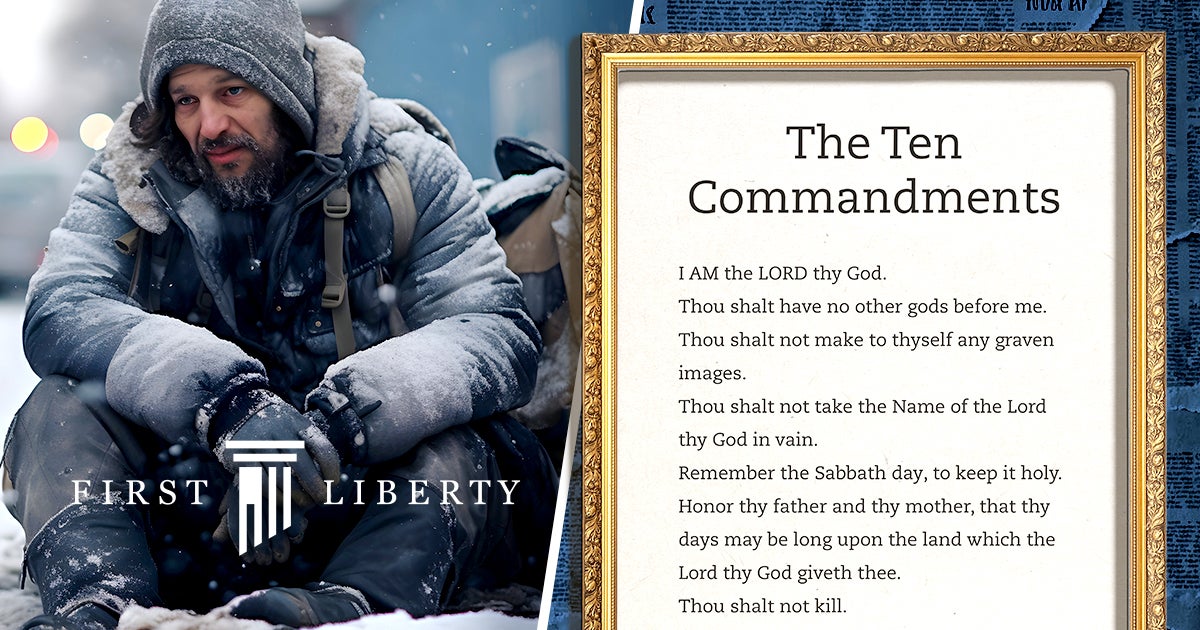
by Jayla Ward & Jorge Gomez • 4 minutes
First Liberty recently filed friend-of-the-court briefs in two important federal court cases.
Arkansas Ten Commandments: Defending History & Tradition
Our attorneys submitted a brief in federal district court in defense of Arkansas’s bill requiring the passive display of the Ten Commandments in the state’s public school classrooms. Gov. Sarah Huckabee Sanders signed the legislation into law in April.
On cue, radical groups filed a lawsuit arguing that the law is unconstitutional because it allegedly promotes “religious coercion and favoritism in matters of faith.”
The brief was filed on behalf of Mark David Hall, Professor in Regent University’s Robertson School of Government, Director of First Liberty’s Religious Liberty in the States, Senior Fellow at the Center for the Study of Law and Religion at Emory University and a Senior Fellow at Baylor University’s Institute for Studies of Religion.
“Passive displays of the Ten Commandments in public schools are constitutional,” our brief notes. “There is no evidence that the founders understood the Establishment Clause to forbid such displays, and there is a long history and tradition of including religious images and language in public spaces. Moreover, there is a long history and tradition of displaying the Ten Commandments in public spaces and teaching about them in private and public schools.”
“The Ten Commandments are a symbol of law and moral conduct with both religious and secular significance, and they have a longstanding national tradition as a matter of law in the United States,” said Erin Smith, Associate Counsel for First Liberty.
“The District Court should summarily reject the lawsuit by these anti-religion activist organizations. We are grateful to both Governor Sarah Huckabee Sanders and Attorney General Griffin for their leadership on this law,” Smith added.
First Liberty Senior Counsel Stephanie Taub testified before the Arkansas Legislature in favor of the law.
“We believe that if this bill is challenged in court, courts will ultimately conclude that posting the 10 Commandments is constitutional and consistent with history and tradition,” Stephanie told the State Agencies and Government Affairs Committee. “The Supreme Court has already noted in The American Legion case that the Ten Commandments have ‘historical significance as one of the foundations of our legal system.’”
This isn’t the only legal battle in Arkansas over Ten Commandments display.
First Liberty is also fighting a major case to stop several radical groups who are attacking the Ten Commandments monument located outside the Arkansas State Capitol. We’re defending the monument as co-counsel with the Arkansas Office of the Attorney General.
In 2015 the Arkansas State Legislature authorized the placement of the donated monument on the Capitol grounds. Less than 24 hours after it was erected in 2017, a man ran over it with his pickup truck and destroyed it. The replacement monument was placed in 2018.
Despite a Supreme Court opinion concluding that a similar Ten Commandments display is constitutional, the Satanic Temple, Freedom from Religion Foundation, American Humanist Association and the Arkansas Society of Freethinkers sued and challenged the display.
We argued the case in federal district court, explaining that the Constitution and established legal precedent affirm that the monument should remain. We’re waiting for the court to issue a decision.
Cities Must Stop Criminalizing Compassion
We filed a brief in district court supporting Burien Free Methodist Church, a local congregation that is suing the city of Burien, Washington after officials threatened to fine the church for serving people in need.
Caring for the poor and displaced is at the core of the church’s mission. Amidst freezing temperatures in the winter of 2023-24, the church hosted a group of homeless neighbors in its parking lot. Working with a local nonprofit, the church ran background checks on all the residents and followed a Code of Conduct to ensure there were no health or safety issues.
But city officials forced the church to choose: either evict its homeless neighbors, face fines of over $100,000, or submit to an uncertain permitting process that might take all winter.
Burien Free Methodist sued in court, claiming the city is using zoning ordinances to single out their ministry to the most vulnerable.
Across America, government officials are criminalizing compassion. First Liberty is fighting multiple cases involving houses of worship and ministries who are being targeted for their charitable efforts and outreach to local communities.
City officials in Bryan, Ohio continue to target Pastor Chris Avell of Dad’s Place Church.
Pastor Chris made the decision to open Dad’s Place 24/7 to serve and minster to anyone who needed help. When bitter winter weather hit the region, many people had no place to go. The church welcomed them in. But Mayor Carrie Schlade decided to launch a crusade against the church. On top of trying to shut down the ministry, the city also criminally charged Pastor Chris.
Pastor Jose Castro and Gethsemani Baptist Church in San Luis, Arizona are also being targeted for feeding the hungry.
For 25 years, the church’s food ministry has helped hungry families. The congregation has distributed hundreds of thousands of pounds of food. About 150 families received food with every distribution.
But San Luis city officials are trying to shut down the church’s food ministry. City officials have sent multiple letters ordering Pastor Jose and the church to stop their food distribution ministry. City code enforcers have even showed up unannounced to issue citations.
Because of the City and Mayor Nieves Riedel’s intimidation tactics, Gethsemani has been forced to significantly cut back its ministry, which means a lot of people are going hungry.
“Churches that take action to care for the homeless should be encouraged and affirmed, not harassed and fined,” said Kayla Toney, Counsel for First Liberty. “The Constitution and federal law protect against government officials who are intent on intimidating churches who want to use their property as a trusted place of safety for a vulnerable population.”